What are Boltzmann brains, and what challenge do they post to the multiverse hypothesis?
I thought I would turn to the atheist theoretical physicist Sean Carroll, who has previously debated William Lane Craig, to explain to us what a Boltzmann brain is, and what threat it posts to the multiverse hypothesis.
Here is Sean Caroll, quoted by About.com:
Ludwig Boltzmann was one of the founders of the field of thermodynamics in the nineteenth century. One of the key concepts was the second law of thermodynamics, which says that the entropy of a closed system always increases. Since the universe is a closed system, we would expect the entropy to decrease over time. This means that, given enough time, the most likely state of the universe is one where everything is the in thermodynamic equilibrium … but we clearly don’t exist in a universe of this type since, after all, there is order all around us in various forms, not the least of which is the fact that we exist.
With this in mind, we can apply the anthropic principle to inform our reasoning by taking into account that we do, in fact, exist. Here the logic gets a little confusing, so I’m going to borrow the words from a couple of more detailed looks at the situation. As described by cosmologist Sean Carroll in From Eternity to Here:
Boltzmann invoked the anthropic principle (although he didn’t call it that) to explain why we wouldn’t find ourselves in one of the very common equilibrium phases: In equilibrium, life cannot exist. Clearly, what we want to do is find the most common conditions within such a universe that are hospitable to life. Or, if we want to be more careful, perhaps we should look for conditions that are not only hospitable to life, but hospitable to the particular kind of intelligent and self-aware life that we like to think we are….
We can take this logic to its ultimate conclusion. If what we want is a single planet, we certainly don’t need a hundred billion galaxies with a hundred billion stars each. And if what we want is a single person, we certainly don’t need an entire planet. But if in fact what we want is a single intelligence, able to think about the world, we don’t even need an entire person–we just need his or her brain.
So the reductio ad absurdum of this scenario is that the overwhelming majority of intelligences in this multiverse will be lonely, disembodied brains, who fluctuate gradually out of the surrounding chaos and then gradually dissolve back into it. Such sad creatures have been dubbed “Boltzmann brains” by Andreas Albrecht and Lorenzo Sorbo….
In a 2004 paper, Albrecht and Sorbo discussed “Boltzmann brains” in their essay:
A century ago Boltzmann considered a “cosmology” where the observed universe should be regarded as a rare fluctuation out of some equilibrium state. The prediction of this point of view, quite generically, is that we live in a universe which maximizes the total entropy of the system consistent with existing observations. Other universes simply occur as much more rare fluctuations. This means as much as possible of the system should be found in equilibrium as often as possible.
From this point of view, it is very surprising that we find the universe around us in such a low entropy state. In fact, the logical conclusion of this line of reasoning is utterly solipsistic. The most likely fluctuation consistent with everything you know is simply your brain (complete with “memories” of the Hubble Deep fields, WMAP data, etc) fluctuating briefly out of chaos and then immediately equilibrating back into chaos again. This is sometimes called the “Boltzmann’s Brain” paradox.
[...]Now that you understand Boltzmann brains as a concept, though, you have to proceed a bit to understanding the “Boltzmann brain paradox” that is caused by applying this thinking to this absurd degree. Again, as formulated by Carroll:
Why do we find ourselves in a universe evolving gradually from a state of incredibly low entropy, rather than being isolated creatures that recently fluctuated from the surrounding chaos?
Unfortunately, there is no clear explanation to resolve this … thus why it’s still classified as a paradox.
Naturalists like to propose the multiverse as a way of explaining away the fine-tuning that we see, and explaining why complex, embodied intelligent beings like ourselves exist. But even if the multiverse hypothesis were true, we still would not expect to observe stars, planets, and conscious embodied intelligent beings. It is far more likely on a multiverse scenario that any observers we had would be “Boltzmann” brains in an empty universe. The multiverse hypothesis doesn’t explain the universe we have, which contains “a hundred billion galaxies with a hundred billion stars each” – not to mention our bodies which are composed of heavy elements, all of which require fine-tuning piled on fine-tuning piled on fine-tuning.
William Lane Craig answered a question about Boltzmann brains a while back, so let’s look at his answer since we saw what his debate opponent said above.
He writes:
Incredible as it may sound, today the principal–almost the only–alternative to a Cosmic Designer to explain the incomprehensibly precise fine tuning of nature’s constants and fundamental quantities is the postulate of a World Ensemble of (a preferably infinite number of) randomly ordered universes. By thus multiplying one’s probabilistic resources, one ensures that by chance alone somewhere in this infinite ensemble finely tuned universes like ours will appear.
Now comes the key move: since observers can exist only in worlds fine-tuned for their existence, OF COURSE we observe our world to be fine-tuned! The worlds which aren’t finely tuned have no observers in them and so cannot be observed! Hence, our observing the universe to be fine-tuned for our existence is no surprise: if it weren’t, we wouldn’t be here to be surprised. So this explanation of fine tuning relies on (i) the hypothesis of a World Ensemble and (ii) an observer self-selection effect.
Now apart from objections to (i) of a direct sort, this alternative faces a very formidable objection to (ii), namely, if we were just a random member of a World Ensemble, then we ought to be observing a very different universe. Roger Penrose has calculated that the odds of our solar system’s forming instantaneously through the random collision of particles is incomprehensibly more probable that the universe’s being fine-tuned, as it is. So if we were a random member of a World Ensemble, we should be observing a patch of order no larger than our solar system in a sea of chaos. Worlds like that are simply incomprehensibly more plentiful in the World Ensemble than worlds like ours and so ought to be observed by us if we were but a random member of such an ensemble.
Here’s where the Boltzmann Brains come into the picture. In order to be observable the patch of order needn’t be even as large as the solar system. The most probable observable world would be one in which a single brain fluctuates into existence out of the quantum vacuum and observes its otherwise empty world. The idea isn’t that the brain is the whole universe, but just a patch of order in the midst of disorder. Don’t worry that the brain couldn’t persist long: it just has to exist long enough to have an observation, and the improbability of the quantum fluctuations necessary for it to exist that long will be trivial in comparison to the improbability of fine tuning.
In other words, the observer self-selection effect is explanatorily vacuous. It does not suffice to show that only finely tuned worlds are observable. As Robin Collins has noted, what needs to be explained is not just intelligent life, but embodied, interactive, intelligent agents like ourselves. Appeal to an observer self-selection effect accomplishes nothing because there is no reason whatever to think that most observable worlds are worlds in which that kind of observer exists. Indeed, the opposite appears to be true: most observable worlds will be Boltzmann Brain worlds.
Allen Hainline explained some of the OTHER problems with the multiverse in a post on Cross Examined’s blog. I recommend taking a look at those as well, because I feel funny even talking about Boltzmann brains. I would rather just say that there is no experimental evidence for the multiverse hypothesis, as I blogged before, and leave it at that. But if the person you are talking to fights you on it, you can disprove the multiverse with the Boltzmann brains.
![]()

















































